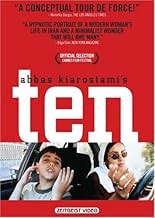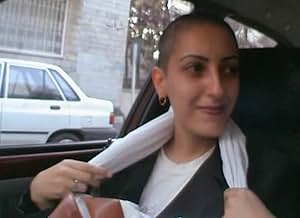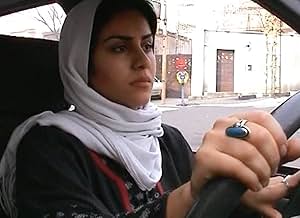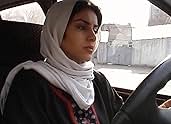AVALIAÇÃO DA IMDb
7,4/10
8,9 mil
SUA AVALIAÇÃO
Um teste social visual na forma de dez conversas entre uma motorista e suas várias furgonetas.Um teste social visual na forma de dez conversas entre uma motorista e suas várias furgonetas.Um teste social visual na forma de dez conversas entre uma motorista e suas várias furgonetas.
- Prêmios
- 1 vitória e 4 indicações no total
Amina Maher
- Amin
- (as Amin Maher)
Roya Akbari
- Prostitute + Lover
- (as Roya Arabshahi)
Avaliações em destaque
Ten is an intriguing movie. Kiarostami explores the abilities of digital camera by mounting it at just two fixed angles on the dashboard of a car, showing us almost only the driver's and the passenger's faces. Such a stationary structure surprises by its moving content, which takes shape as the movie unfolds.
The driver is a young Iranian divorcée, recently remarried, whose conversations with a son, sisters, a young and an old woman makes up the ten episodes of the movie.
The performance taken from the kid is astonishingly natural, and other characters also appear to be just playing their everyday lives. Kiarostami opens an eye through the little gap of its two fixed digital cameras on the mundane facts of the Iran's capital life as experienced by a typical middle-class woman. The plots are so natural no one can find a better way of experiencing the knotted, contradictory complexity of such a woman's life in Iran from outside. The flow is of the scenes is smooth and the dialogues are, at least to the Iranian audience, courageous and funny, though familiar at the same time. It's a movie worth watching more than once.
The driver is a young Iranian divorcée, recently remarried, whose conversations with a son, sisters, a young and an old woman makes up the ten episodes of the movie.
The performance taken from the kid is astonishingly natural, and other characters also appear to be just playing their everyday lives. Kiarostami opens an eye through the little gap of its two fixed digital cameras on the mundane facts of the Iran's capital life as experienced by a typical middle-class woman. The plots are so natural no one can find a better way of experiencing the knotted, contradictory complexity of such a woman's life in Iran from outside. The flow is of the scenes is smooth and the dialogues are, at least to the Iranian audience, courageous and funny, though familiar at the same time. It's a movie worth watching more than once.
"Ten" really impressed me for many reasons. The first one is the interpretation of the non-professional actresses and the boy Amin Maher. It is simply amazing the first sequence (number 10) with fifteen minutes of dialogs between the lead character and her son without any cut. The second reason is the intense and impressive insight in the repressed women's world in Iran. I believe that most of the Westerns have no idea about the feelings and the culture of Iranian women, and Abbas Kiarostami shows very real dialogs picturing the lifestyle of a middle class woman and some samples in other women of different classes (the prostitute, the religious woman etc.). The third reason was the simplicity and the originality of the location: inside a car, with a divorced woman transporting her resented son; her sister; a prostitute; an old lady; and a romantic young woman, along different days. I would never imagine such a splendid scenario for a movie with such a theme. Last but not the least, the remarkable beauty of the face of the driver (Mania Akbari) is awesome: she is exotic for Brazilian standards, but really a very beautiful woman. My vote is eight.
Title (Brazil): "10 Dez" ("10 Ten")
Title (Brazil): "10 Dez" ("10 Ten")
The premise is very simple. A beautiful Iranian woman, married to her second husband (in a society that makes divorce nearly impossible for women to obtain) drives her car around town. She takes her son to a swim meet, goes shopping with her sister, gives an old woman a lift to Prayer, etc. The title of the film refers to the fact that there are 10 "chapters" to the film, each representing a different conversation she has with her various passengers on different days. By experiencing these exchanges, the viewer can expect a crash course on middle class life in Iran. Like middle class life anywhere, there are the written rules and conventions that one must obey, and then there are the practicalities, and the REalities. There is what is true, and what people tell themselves is true; what they want, and what they tell themselves they want. As in any society on earth, including this highly controlled, religiously based one, there is the hypocrisy. And we can soon see from the conversations our Driver has with her passengers, that there are also the largely unspoken hopes, fears, needs and insecurities of these people, who often appear to be going through the motions of life, rather than truly living it.
The film mostly focuses on how women view this world; but their perspective is primarily organized around and driven by their relationships with men, be they fathers, boyfriends, husbands or sons. The film is difficult to watch at first, because things quickly escalate into discomfort with the driver's very first passenger, but sticking it out is well worth the investment, as the exchanges each build on the ones that came before it, getting progressively deeper and deeper.
The women in this film are covered from head to foot, but still manage to lay themselves completely bare to us. It's a very simple concept, elevated to an amazing accomplishment. You will learn a great deal about life in Iran, people in general, and possibly yourself. I expect to be thinking about this movie for weeks, if not much much longer.
The film mostly focuses on how women view this world; but their perspective is primarily organized around and driven by their relationships with men, be they fathers, boyfriends, husbands or sons. The film is difficult to watch at first, because things quickly escalate into discomfort with the driver's very first passenger, but sticking it out is well worth the investment, as the exchanges each build on the ones that came before it, getting progressively deeper and deeper.
The women in this film are covered from head to foot, but still manage to lay themselves completely bare to us. It's a very simple concept, elevated to an amazing accomplishment. You will learn a great deal about life in Iran, people in general, and possibly yourself. I expect to be thinking about this movie for weeks, if not much much longer.
My experience with Iranian film is pretty superficial having only seen a handful, but none have disappointed me. I saw Kiarostami's early film Where Does The Friend Live? and was completely blown away. I then saw Saalam Cinema by Iran's other giant Mohsen Makhmalbaf - and then I realised just how important this country's output has been.
Ten did nothing to diminish this view, and I'll try not to repeat much of what's already been said here. I saw an Iranian person on this site claim that there was too much lost in the translation from Farsi to English. This is always the case with translation, but I am quite sure Ten gets away with it. I recently saw Ingmar Bergman's Saraband and if you think language being stilted ruins a movie then I am sure seeing that film will shatter the view. The single thing that destroys it in both cases is the incredible power of the acting - the truth lies in their facial expression. I am quite sure 9 out of 10 people asked without context would swear blind Ten was a documentary.
In the western world overrun by "reality" TV, its significance is lost on some, but if you take the time to realise that these people are actually acting - and more than likely doing it for the first time - thats where the power lies. Try taking this film, put it in America and put Hollywood A-Listers in the car and see where it goes. Basically, how you could call both what they do and what happens in this film acting is opened to debate. This is true of the majority of Iranian output.
Ten would be significant for these reasons alone, but when you take into account how much insight you gain into the life of a woman in there who tries to say no to male domination and to "love herself" it really comes into its own. This is the case of much of this countries output - and what sets is far apart from other countries. What we learn ultimately is this struggle, though perhaps more explicit in Iran, is a struggle felt by all women in the world. It's a film which in that way unites rather than divides which in light of Iran's current status in global affairs is what probably what makes it one of the more important Cinema's in the world.
Ten did nothing to diminish this view, and I'll try not to repeat much of what's already been said here. I saw an Iranian person on this site claim that there was too much lost in the translation from Farsi to English. This is always the case with translation, but I am quite sure Ten gets away with it. I recently saw Ingmar Bergman's Saraband and if you think language being stilted ruins a movie then I am sure seeing that film will shatter the view. The single thing that destroys it in both cases is the incredible power of the acting - the truth lies in their facial expression. I am quite sure 9 out of 10 people asked without context would swear blind Ten was a documentary.
In the western world overrun by "reality" TV, its significance is lost on some, but if you take the time to realise that these people are actually acting - and more than likely doing it for the first time - thats where the power lies. Try taking this film, put it in America and put Hollywood A-Listers in the car and see where it goes. Basically, how you could call both what they do and what happens in this film acting is opened to debate. This is true of the majority of Iranian output.
Ten would be significant for these reasons alone, but when you take into account how much insight you gain into the life of a woman in there who tries to say no to male domination and to "love herself" it really comes into its own. This is the case of much of this countries output - and what sets is far apart from other countries. What we learn ultimately is this struggle, though perhaps more explicit in Iran, is a struggle felt by all women in the world. It's a film which in that way unites rather than divides which in light of Iran's current status in global affairs is what probably what makes it one of the more important Cinema's in the world.
The front-page review of this film simply doesn't do this marvelous film justice. Renowned Iranian film-maker Abbas Kiarostami takes an innovative approach at giving us a very deep glimpse not only into the life of mother and child, but also into Iran, its society and the situation of women transitioning to a more assertive role in society (however, I don't think one should be confused that the issues women face in Iran are not relevant to women elsewhere in the world, including the West).
The film has two fixed camera angles, one giving us a view of the driver-side and the other a view of the passenger side of an automobile. The driver is a mother who has left her husband and now resides with her new lover (she is the common thread in all ten "episodes"). Each sequence places a different person in the passenger seat, with particular emphasis on her son (who rides in four of the 10 scenes, if I'm not mistaken).
It is this mother-son relationship that is at the crux of the film, and for good reason. The performances of these two characters was nothing short of amazing. The boy in particular, with every eye-twitch, frown, smile, and outburst was able to convey a frighteningly realistic portrayal of a boy who is all at once obstinate, angry, disrespectful, and immature, yet still sweet and somewhat an innocent victim of the situation. He is unforgiving to his mother for walking out on him and "breaking up the family" and is reluctant to accept any explanation his mother offers. They trade barbs and though the love is there, you can see the seeds already planted in the young adolescent of a society that subordinates women to their male partners. Here, it is so profound that even a pre-teen lectures his mother on right and wrong.
The mother bounces back and forth between defending herself to accepting blame, showing the cracks of guilt that clearly lie beneath her composed and beautiful surface. And it's a beauty that her son can't recognize: she's a sexy passionate woman with needs of not just a mother but also as a lover and a liver; but like all children he can only see her as an adult and a mother.
The other key character involves a friend who desperately seeks a life partner, but finds herself unsuccessful at every turn. Most recently, a man she has been seeing tells her that he cannot marry her because he does not love her. She coyly reveals from under her veil that in her grief she has shaved her head completely. This act is astonishing not because it is defiant but because it is terribly charming. She can't offer an explanation as to why she has done it, but no explanation is necessary. Who hasn't at some time when an ego has been made fragile by rejection, sought to change hair, clothing, face, self? And it is with this scene, with veil pulled back, that the woman's beauty is uncovered, not because we see her hair or her bald head, but because of the insight the shaving act gives to her character, and her innocent embarrassment brings a smile to her tear-stained face that lights up the screen.
I give the film a 9 and not a 10 because of one sequence involving a conversation with a prostitute in the passenger seat. Presumably the driver has given a ride to hitch-hiker, leading to an intelligent conversation/debate about the world's oldest profession. But this scene seemed a little out-of-place, contrived, and added little to the more general theme of the rest of the film. This one slip-up notwithstanding, "Ten" is a creative and wonderful experience for film lovers who seek something out of the ordinary. And it has a final scene which punctuates the film perfectly.
The film has two fixed camera angles, one giving us a view of the driver-side and the other a view of the passenger side of an automobile. The driver is a mother who has left her husband and now resides with her new lover (she is the common thread in all ten "episodes"). Each sequence places a different person in the passenger seat, with particular emphasis on her son (who rides in four of the 10 scenes, if I'm not mistaken).
It is this mother-son relationship that is at the crux of the film, and for good reason. The performances of these two characters was nothing short of amazing. The boy in particular, with every eye-twitch, frown, smile, and outburst was able to convey a frighteningly realistic portrayal of a boy who is all at once obstinate, angry, disrespectful, and immature, yet still sweet and somewhat an innocent victim of the situation. He is unforgiving to his mother for walking out on him and "breaking up the family" and is reluctant to accept any explanation his mother offers. They trade barbs and though the love is there, you can see the seeds already planted in the young adolescent of a society that subordinates women to their male partners. Here, it is so profound that even a pre-teen lectures his mother on right and wrong.
The mother bounces back and forth between defending herself to accepting blame, showing the cracks of guilt that clearly lie beneath her composed and beautiful surface. And it's a beauty that her son can't recognize: she's a sexy passionate woman with needs of not just a mother but also as a lover and a liver; but like all children he can only see her as an adult and a mother.
The other key character involves a friend who desperately seeks a life partner, but finds herself unsuccessful at every turn. Most recently, a man she has been seeing tells her that he cannot marry her because he does not love her. She coyly reveals from under her veil that in her grief she has shaved her head completely. This act is astonishing not because it is defiant but because it is terribly charming. She can't offer an explanation as to why she has done it, but no explanation is necessary. Who hasn't at some time when an ego has been made fragile by rejection, sought to change hair, clothing, face, self? And it is with this scene, with veil pulled back, that the woman's beauty is uncovered, not because we see her hair or her bald head, but because of the insight the shaving act gives to her character, and her innocent embarrassment brings a smile to her tear-stained face that lights up the screen.
I give the film a 9 and not a 10 because of one sequence involving a conversation with a prostitute in the passenger seat. Presumably the driver has given a ride to hitch-hiker, leading to an intelligent conversation/debate about the world's oldest profession. But this scene seemed a little out-of-place, contrived, and added little to the more general theme of the rest of the film. This one slip-up notwithstanding, "Ten" is a creative and wonderful experience for film lovers who seek something out of the ordinary. And it has a final scene which punctuates the film perfectly.
Você sabia?
- CuriosidadesApart from Mania Akbari, actors are non-professional. The young boy is played by her own son and their relationship is partly based on real-life elements.
- Erros de gravaçãoCar windows, both driver's and passenger's, vary between being closed, part-open or open between shots.
- Citações
Prostitute: [to a Married woman] You are wholesailers. We are retailers.
- Trilhas sonorasWalking In The Air
Written and Performed by Howard Blake
© Chester Music Limited represented by Première Music Group
Principais escolhas
Faça login para avaliar e ver a lista de recomendações personalizadas
- How long is Ten?Fornecido pela Alexa
Detalhes
- Data de lançamento
- Países de origem
- Central de atendimento oficial
- Idioma
- Também conhecido como
- Ten
- Locações de filme
- Empresas de produção
- Consulte mais créditos da empresa na IMDbPro
Bilheteria
- Faturamento bruto nos EUA e Canadá
- US$ 105.990
- Fim de semana de estreia nos EUA e Canadá
- US$ 10.559
- 9 de mar. de 2003
- Faturamento bruto mundial
- US$ 452.895
Contribua para esta página
Sugerir uma alteração ou adicionar conteúdo ausente






















